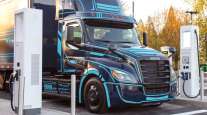Staff Reporter
DOE Outlines Higher Upfront Costs for Green Heavy Trucks

[Stay on top of transportation news: Get TTNews in your inbox.]
Trucking companies are being advised to seek government incentives to help offset high price tags of green heavy trucks that are forecast based on federal figures to cost $28,000 to $297,500 more than diesel engines vehicles.
The Department of Energy’s Vehicles Technologies office in December released a seven-page report called “2022 Incremental Purchase Cost Methodology and Results for Clean Vehicles.” It revealed extremely high upfront costs for Class 8 electric and fuel cell trucks compared with those fueled by diesel.
The purpose of the study was to examine costs for electric and fuel cell vehicles compared with those with internal combustion engines to look at affordability in the government’s efforts to promote the nation’s adoption of green vehicles.
Using $160,000 as the baseline for representative vehicle costs for a longhaul Class 8 truck, DOE projected the following purchase costs: $457,000 (186% higher) for a battery-electric heavy truck, $324,000 for a plug-in hybrid version (up 103%) and $265,500 for a hydrogen fuel cell-powered one (66% more).

Vieth
Lydia Vieth, research analyst in electrification and autonomy at ACT Research, viewed DOE’s vehicle cost estimates as “optimistic” because the figures don’t include total cost of ownership (different from cost parity for upfront purchases), which she said is a large factor when people purchase commercial vehicles rather than consumer ones.
“It is important for companies to be aware of and seek out incentives and subsidies where possible. Under the Inflation Reduction Act, there is an up to $40,000 credit for clean commercial vehicles. Many states also have clean vehicle incentive programs,” she said. “As mandates become stricter, there will likely be more government support. For instance, infrastructure is needed to go along with vehicle mandates or incentives to make purchasing clean vehicles more viable.”
Indiana-based ACT Research, founded in 1986, is a top publisher of commercial vehicle industry data, market analysis and forecasting for the North American market. It is completing an in-depth decarbonization study for release in June that will analyze new technology adoption for Classes 4-8 vehicles through 2040.
DOE’s reports surmised that all green vehicle classes larger than 14,000 pounds would have incremental costs of $66,000 or more. “The incremental cost of a clean vehicle is the excess of the purchase price of such vehicle over the price of a comparable vehicle,” the report explained.
Government analysts found batteries to be the main force driving the huge purchase price differentials for electric vehicle heavy trucks and plug-in battery hybrid versions. EV heavy trucks and hybrids have other add-on costs for electric powertrain components.
Although comparing various makes and models was difficult, DOE stated it was “relatively straightforward to analytically estimate the incremental cost of deploying an electric powertrain in place of the powertrain of an internal combustion engine vehicle.”
Fuel cell Class 8 price tags rose above diesel models mainly due to hydrogen storage, fuel cells and additional powertrain components.
Vieth said it is normal with new technologies to have higher incremental costs of green heavy trucks, but “our research and modeling suggests that the FCEV [fuel cell] would have a higher incremental cost than the BEV [battery]. We feel the DOE incremental costs seem understated, from an overall perspective.”
She added there can be important differences in total cost of ownership “depending on duty cycle, within class.”
Want more news? Listen to today's daily briefing below or go here for more info:




